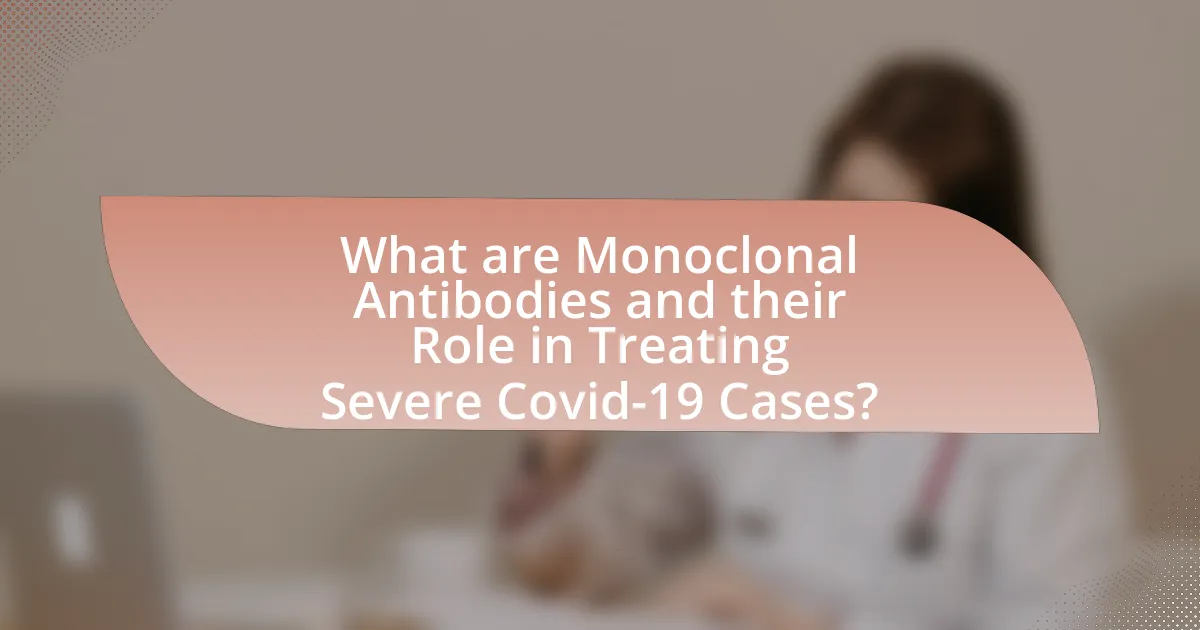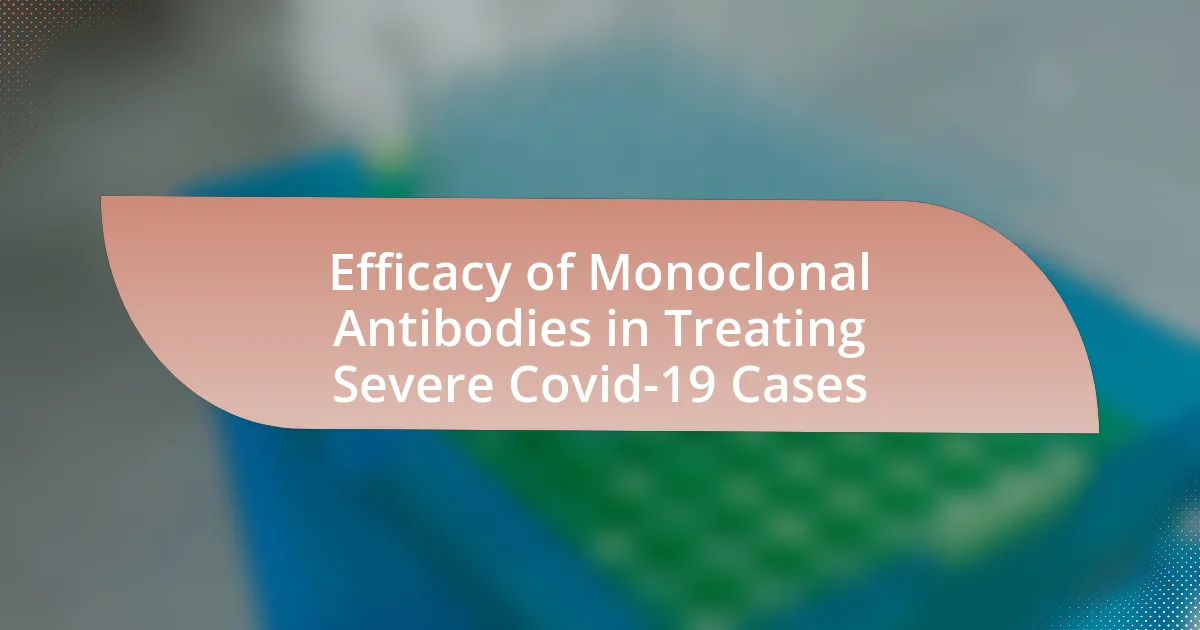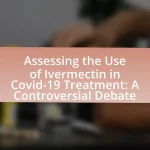Monoclonal antibodies are laboratory-engineered molecules that replicate the immune system’s ability to combat pathogens, specifically targeting the spike protein of the SARS-CoV-2 virus in severe Covid-19 cases. This article examines the efficacy of monoclonal antibodies in reducing hospitalization and mortality rates among high-risk patients, supported by clinical trial data demonstrating a 70% decrease in hospitalization risk. It also explores the mechanism of action, types of monoclonal antibodies used, production methods, potential benefits and risks, and their role in conjunction with other Covid-19 treatments. Additionally, guidelines for administration and monitoring of patients receiving monoclonal antibody therapy are discussed, emphasizing their significance in managing severe Covid-19 cases.

What are Monoclonal Antibodies and their Role in Treating Severe Covid-19 Cases?
Monoclonal antibodies are laboratory-made molecules that mimic the immune system’s ability to fight off harmful pathogens like viruses. In the context of severe Covid-19 cases, these antibodies target the spike protein of the SARS-CoV-2 virus, neutralizing its ability to infect human cells. Clinical studies have demonstrated that monoclonal antibodies can reduce the risk of hospitalization and death in high-risk patients with Covid-19. For instance, a study published in the New England Journal of Medicine showed that patients treated with monoclonal antibodies had a 70% lower risk of hospitalization compared to those who did not receive the treatment. This evidence underscores the significant role monoclonal antibodies play in managing severe Covid-19 cases by providing targeted therapy that enhances the immune response against the virus.
How do Monoclonal Antibodies function in the immune response?
Monoclonal antibodies function in the immune response by specifically targeting and binding to antigens on pathogens, such as viruses, thereby neutralizing them and marking them for destruction by other immune cells. These antibodies are produced from a single clone of B cells, ensuring uniformity and specificity against a particular antigen. For instance, in the context of COVID-19, monoclonal antibodies like casirivimab and imdevimab have been shown to reduce viral load and improve clinical outcomes in patients by preventing the virus from entering human cells and facilitating the immune system’s ability to eliminate the virus. Studies have demonstrated that patients treated with monoclonal antibodies experience a significant reduction in hospitalization and death rates, underscoring their efficacy in managing severe COVID-19 cases.
What is the mechanism of action of Monoclonal Antibodies against SARS-CoV-2?
Monoclonal antibodies against SARS-CoV-2 function by specifically binding to the spike protein of the virus, thereby blocking its ability to enter human cells. This binding prevents the virus from attaching to the ACE2 receptor, which is essential for viral entry and subsequent infection. Studies have shown that monoclonal antibodies can neutralize the virus in vitro, demonstrating their effectiveness in inhibiting viral replication and spread. For instance, clinical trials have indicated that treatments with monoclonal antibodies can significantly reduce hospitalization rates and improve outcomes in patients with severe COVID-19.
How do Monoclonal Antibodies differ from traditional therapies?
Monoclonal antibodies differ from traditional therapies primarily in their targeted mechanism of action. While traditional therapies often employ broad-spectrum approaches that can affect multiple pathways or cell types, monoclonal antibodies are designed to specifically bind to particular antigens on pathogens or diseased cells, enhancing the immune response against them. For instance, in the context of severe Covid-19 cases, monoclonal antibodies like bamlanivimab and casirivimab target the spike protein of the SARS-CoV-2 virus, blocking its ability to enter human cells. This specificity can lead to more effective treatment outcomes with potentially fewer side effects compared to traditional therapies, which may indiscriminately affect healthy cells along with the target.
What types of Monoclonal Antibodies are used for Covid-19 treatment?
Monoclonal antibodies used for Covid-19 treatment include Bamlanivimab, Casirivimab, Imdevimab, and Sotrovimab. These antibodies target the spike protein of the SARS-CoV-2 virus, neutralizing its ability to infect human cells. Clinical trials have demonstrated that these monoclonal antibodies can reduce the risk of hospitalization and severe disease in high-risk patients, with Bamlanivimab and Etesevimab showing a 70% reduction in hospitalization rates in certain studies.
Which specific Monoclonal Antibodies have received emergency use authorization?
The specific monoclonal antibodies that have received emergency use authorization include Bamlanivimab, Casirivimab and Imdevimab, and Sotrovimab. These monoclonal antibodies were authorized by the U.S. Food and Drug Administration (FDA) to treat COVID-19 in certain patients, demonstrating efficacy in reducing the severity of the disease and the need for hospitalization. The FDA’s emergency use authorization is based on clinical trial data showing that these treatments can help mitigate the effects of COVID-19 in high-risk populations.
How are these Monoclonal Antibodies produced and tested?
Monoclonal antibodies are produced through a process that involves immunizing mice with a specific antigen, followed by the fusion of mouse spleen cells with myeloma cells to create hybridomas. These hybridomas are then screened for the production of the desired antibody, which is subsequently cloned and expanded. Testing of monoclonal antibodies involves in vitro assays to evaluate their binding affinity and neutralization capacity against the target antigen, followed by in vivo studies to assess their efficacy and safety in animal models before progressing to clinical trials in humans. This rigorous process ensures that only the most effective antibodies are selected for therapeutic use, as evidenced by their application in treating severe COVID-19 cases, where they have shown to reduce hospitalization rates and improve patient outcomes.
What evidence supports the efficacy of Monoclonal Antibodies in severe Covid-19 cases?
Monoclonal antibodies have demonstrated efficacy in treating severe Covid-19 cases, as evidenced by clinical trials showing reduced hospitalization and mortality rates. For instance, a study published in the New England Journal of Medicine indicated that patients receiving monoclonal antibodies had a 70% lower risk of hospitalization compared to those receiving standard care. Additionally, the FDA has granted Emergency Use Authorization for several monoclonal antibody therapies based on data from randomized controlled trials, which consistently show improved outcomes in high-risk patients. These findings collectively support the use of monoclonal antibodies as a critical therapeutic option for severe Covid-19 cases.
What clinical trials have been conducted to evaluate their effectiveness?
Clinical trials evaluating the effectiveness of monoclonal antibodies in treating severe COVID-19 cases include the RECOVERY trial and the ACTIV-3 trial. The RECOVERY trial, conducted in the UK, demonstrated that the monoclonal antibody treatment reduced mortality in hospitalized patients with severe COVID-19. The ACTIV-3 trial, a multi-site study in the United States, assessed the efficacy of monoclonal antibodies in hospitalized patients and found that certain monoclonal antibodies improved clinical outcomes. These trials provide substantial evidence supporting the use of monoclonal antibodies in managing severe COVID-19 cases.
What are the outcomes of these trials in terms of patient recovery?
The outcomes of trials assessing monoclonal antibodies in treating severe COVID-19 cases indicate significant improvements in patient recovery. Specifically, studies have shown that patients receiving monoclonal antibody treatments experienced reduced hospitalization rates and shorter recovery times compared to those receiving standard care. For instance, a trial published in the New England Journal of Medicine demonstrated that patients treated with monoclonal antibodies had a 70% lower risk of hospitalization or death within 28 days compared to the control group. This evidence supports the efficacy of monoclonal antibodies in enhancing recovery outcomes for severe COVID-19 patients.

What are the potential benefits and risks of using Monoclonal Antibodies for Covid-19?
Monoclonal antibodies for Covid-19 offer significant benefits, including reduced severity of illness, decreased hospitalization rates, and improved recovery times. Clinical studies have shown that these therapies can lower the risk of severe disease by approximately 70% in high-risk patients when administered early in the infection. However, risks include potential allergic reactions, infusion-related side effects, and the possibility of viral mutations leading to reduced efficacy. For instance, some variants of the virus have shown resistance to certain monoclonal antibody treatments, which underscores the importance of ongoing monitoring and adaptation of therapeutic strategies.
What benefits do Monoclonal Antibodies provide to patients with severe Covid-19?
Monoclonal antibodies provide significant benefits to patients with severe Covid-19 by reducing the risk of hospitalization and death. Clinical studies have demonstrated that these therapies can neutralize the virus, thereby decreasing viral load and mitigating the severity of the disease. For instance, a study published in the New England Journal of Medicine found that patients treated with monoclonal antibodies had a 70% lower risk of hospitalization compared to those who did not receive the treatment. Additionally, monoclonal antibodies can help shorten the duration of symptoms and improve recovery times, making them a crucial therapeutic option for managing severe Covid-19 cases.
How do Monoclonal Antibodies reduce hospitalization rates?
Monoclonal antibodies reduce hospitalization rates by neutralizing the virus that causes COVID-19, thereby preventing severe disease progression. These antibodies specifically target the spike protein of the SARS-CoV-2 virus, inhibiting its ability to enter and infect human cells. Clinical studies, such as those published in the New England Journal of Medicine, have shown that patients treated with monoclonal antibodies experienced a significant reduction in hospitalization rates, with a reported decrease of up to 70% in high-risk populations. This efficacy is attributed to the timely administration of these therapies, which can mitigate the viral load and enhance the immune response before the onset of severe symptoms.
What is their impact on mortality rates among severe cases?
Monoclonal antibodies significantly reduce mortality rates among severe COVID-19 cases. Clinical studies, such as the one published in the New England Journal of Medicine, demonstrated that patients receiving monoclonal antibody treatment had a 70% lower risk of death compared to those who did not receive the treatment. This evidence indicates that monoclonal antibodies play a crucial role in improving survival outcomes for patients with severe manifestations of the disease.
What are the possible side effects and limitations of Monoclonal Antibody treatment?
Monoclonal antibody treatment can lead to side effects such as allergic reactions, infusion-related reactions, and increased risk of infections. Allergic reactions may manifest as rash, itching, or difficulty breathing, while infusion-related reactions can include fever, chills, and nausea. Additionally, the limitations of monoclonal antibody treatment include reduced efficacy against certain variants of the virus and the necessity for timely administration, as it is most effective when given early in the course of the disease. Studies have shown that the effectiveness of monoclonal antibodies can vary based on the specific variant of the virus, highlighting the importance of ongoing research and adaptation of treatment protocols.
What common side effects have been reported in patients?
Common side effects reported in patients receiving monoclonal antibodies for severe COVID-19 include infusion-related reactions, fever, chills, fatigue, and nausea. Clinical studies have documented these effects, with infusion-related reactions occurring in approximately 10-20% of patients, often manifesting as mild to moderate symptoms. These findings are supported by data from trials such as the RECOVERY trial, which highlighted the safety profile of monoclonal antibodies in treating COVID-19.
Are there any contraindications for using Monoclonal Antibodies?
Yes, there are contraindications for using monoclonal antibodies. Patients with a history of severe allergic reactions to monoclonal antibodies or any component of the formulation should not receive these treatments. Additionally, individuals with certain underlying health conditions, such as severe immunocompromised states or active infections, may also be advised against using monoclonal antibodies due to potential risks and complications.

How do Monoclonal Antibodies fit into the overall treatment strategy for severe Covid-19?
Monoclonal antibodies are a critical component of the treatment strategy for severe Covid-19, as they target specific viral proteins to neutralize the virus and reduce disease severity. These therapies have been shown to decrease hospitalization rates and improve clinical outcomes in high-risk patients when administered early in the course of the disease. For instance, clinical trials, such as those conducted by the National Institutes of Health, have demonstrated that monoclonal antibodies can significantly lower the risk of progression to severe disease and mortality in patients with Covid-19.
What role do Monoclonal Antibodies play alongside other Covid-19 treatments?
Monoclonal antibodies play a critical role in the treatment of Covid-19 by providing targeted therapy that can reduce viral load and prevent disease progression, particularly in high-risk patients. These antibodies work alongside other treatments, such as antiviral medications and corticosteroids, to enhance overall therapeutic efficacy. For instance, studies have shown that the combination of monoclonal antibodies with antiviral agents like remdesivir can lead to improved clinical outcomes, including reduced hospitalization rates and shorter recovery times. Additionally, the use of monoclonal antibodies has been associated with a decrease in the need for supplemental oxygen and mechanical ventilation in severe cases, highlighting their importance in a multi-faceted treatment approach.
How do they compare to antiviral medications and corticosteroids?
Monoclonal antibodies differ from antiviral medications and corticosteroids in their mechanism of action and therapeutic application. Monoclonal antibodies target specific viral proteins to neutralize the virus, while antiviral medications inhibit viral replication, and corticosteroids reduce inflammation in severe cases. Studies have shown that monoclonal antibodies can significantly reduce hospitalization rates in high-risk COVID-19 patients, demonstrating their efficacy in early treatment, whereas antiviral medications like remdesivir are more effective when administered during the viral replication phase. Corticosteroids, such as dexamethasone, are beneficial in later stages of COVID-19 by mitigating the immune response but do not directly target the virus. This distinction highlights the complementary roles of these treatments in managing severe COVID-19 cases.
What is the recommended timing for administering Monoclonal Antibodies?
The recommended timing for administering monoclonal antibodies is within the first 10 days of symptom onset in COVID-19 patients. This timeframe is crucial as studies indicate that early intervention can significantly reduce the risk of hospitalization and severe disease progression. For instance, the FDA has authorized the use of certain monoclonal antibodies for outpatient treatment in patients with mild to moderate COVID-19 who are at high risk for severe disease, emphasizing the importance of timely administration to maximize therapeutic efficacy.
What are the guidelines for administering Monoclonal Antibodies in clinical practice?
The guidelines for administering monoclonal antibodies in clinical practice include ensuring the patient meets specific eligibility criteria, such as being at high risk for severe COVID-19 and having mild to moderate symptoms. Administration should occur as soon as possible after diagnosis and within 10 days of symptom onset. Healthcare providers must monitor patients for infusion-related reactions during and after administration, typically for at least one hour. Dosing and administration routes vary by specific monoclonal antibody product, and adherence to the manufacturer’s guidelines is essential for efficacy and safety. These guidelines are supported by clinical trial data demonstrating the effectiveness of monoclonal antibodies in reducing hospitalization and death in high-risk populations.
What protocols should healthcare providers follow for patient selection?
Healthcare providers should follow evidence-based protocols for patient selection that include assessing clinical criteria, laboratory results, and risk factors associated with severe COVID-19 cases. Specifically, providers should evaluate patients for eligibility based on factors such as age, comorbidities, and the severity of symptoms, as outlined in guidelines from the National Institutes of Health (NIH) and the World Health Organization (WHO). These guidelines recommend prioritizing patients who are at higher risk for progression to severe disease, such as those with underlying health conditions like diabetes or cardiovascular disease, and those who present with significant respiratory distress. Adhering to these protocols ensures that monoclonal antibody treatments are administered to the most appropriate candidates, thereby maximizing therapeutic efficacy and improving patient outcomes.
How should Monoclonal Antibodies be administered to maximize efficacy?
Monoclonal antibodies should be administered intravenously to maximize efficacy in treating severe COVID-19 cases. This method allows for rapid delivery of the antibodies into the bloodstream, ensuring higher bioavailability and quicker therapeutic action. Studies have shown that intravenous administration leads to better outcomes compared to subcutaneous or intramuscular routes, as it achieves higher serum concentrations of the antibodies more efficiently. For instance, clinical trials have demonstrated that patients receiving intravenous monoclonal antibodies experienced reduced hospitalization rates and improved recovery times, validating the effectiveness of this administration route.
What are the best practices for monitoring patients receiving Monoclonal Antibody treatment?
The best practices for monitoring patients receiving Monoclonal Antibody treatment include regular assessment of vital signs, monitoring for infusion-related reactions, and evaluating clinical symptoms for improvement or deterioration. Vital signs should be checked frequently during and after the infusion to detect any immediate adverse reactions, which can occur in up to 30% of patients. Additionally, healthcare providers should observe patients for signs of allergic reactions, such as rash or difficulty breathing, and manage these promptly. Clinical symptoms, including respiratory status and oxygen saturation levels, should be closely monitored to assess the effectiveness of the treatment and guide further management. These practices are supported by clinical guidelines from organizations such as the National Institutes of Health, which emphasize the importance of vigilant monitoring to ensure patient safety and treatment efficacy.
What parameters should be monitored during and after treatment?
During and after treatment with monoclonal antibodies for severe COVID-19 cases, key parameters to monitor include vital signs, oxygen saturation levels, laboratory markers of inflammation (such as C-reactive protein and ferritin), and renal function. Monitoring vital signs ensures that any changes in respiratory or cardiovascular status are promptly addressed. Oxygen saturation levels are critical for assessing respiratory function and the effectiveness of treatment. Laboratory markers provide insight into the inflammatory response and potential complications, while renal function tests help identify any adverse effects of the treatment on kidney health. These parameters are essential for evaluating the patient’s response to therapy and guiding further management.
How can healthcare providers assess treatment effectiveness in patients?
Healthcare providers can assess treatment effectiveness in patients by utilizing clinical outcomes, patient-reported outcomes, and biomarkers. Clinical outcomes include measuring improvements in symptoms, recovery rates, and mortality rates, which provide direct evidence of treatment efficacy. Patient-reported outcomes, such as quality of life and symptom relief, offer insights into the patient’s perspective on treatment effectiveness. Biomarkers, including viral load and inflammatory markers, can indicate physiological responses to treatment. For instance, studies have shown that monoclonal antibodies significantly reduce hospitalization rates in severe COVID-19 cases, demonstrating their effectiveness in clinical settings.


